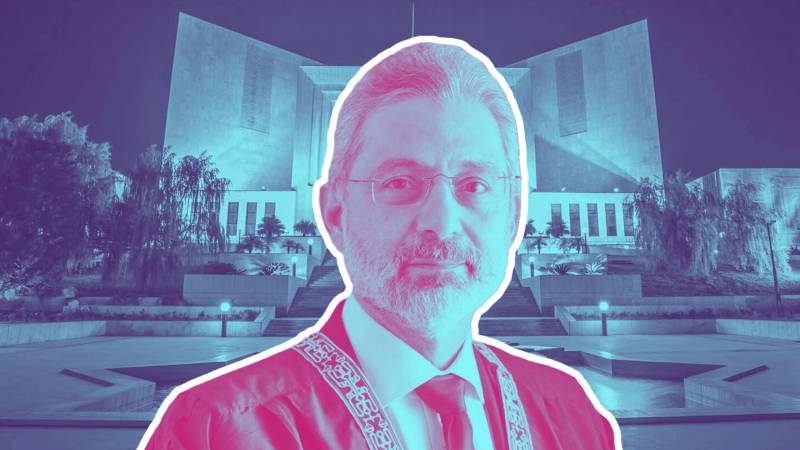In a recent ruling, the Supreme Court of Pakistan reversed its earlier interpretation of Article 63A, which had declared members of the National Assembly immediately disqualified for voting against the wishes of their party. A resolution of no-confidence against then-prime minister Imran Khan was introduced in March 2022, marking the start of the political drama. The Supreme Court stepped in following a tense political process that included Deputy Speaker Qasim Suri stalling the vote and President Arif Alvi dissolving the National Assembly on Imran Khan’s recommendation. It ruled that the dissolution and the Deputy Speaker’s acts were unlawful, restoring the National Assembly and allowing the vote to continue. A transfer of power occurred on April 10, 2022, when the National Assembly effectively removed Imran Khan from office by a majority vote. Nevertheless, during these proceedings, President Alvi requested the Supreme Court’s view on Article 63A, which deals with the disqualification of members for defection under Article 186 of the Constitution. This advisory opinion, which was issued together with the court’s decision regarding the vote of no-confidence, became the focus of the Supreme Court Bar Association’s (SCBA) following a review petition.
The Constitution of Pakistan addresses the disqualification of lawmakers for defection under Article 63A. If a member votes against the party’s position on important votes, such as a vote of no-confidence, it describes a procedure by which the party leader might declare that member disqualified. Following that, the Election Commission must confirm the declaration, and the Supreme Court may be appealed. The Supreme Court’s majority decided in May 2022 that votes cast by members who defected should not be counted, so disqualifying them immediately. Many believed that this interpretation went beyond what was stated in Article 63A and could change the function of the Election Commission, the party leader, and even the parliamentary process. Some who opposed the decision claimed that it expanded judicial power into the political sphere and limited the constitutionally guaranteed procedural protections.
A five-member bench headed by Chief Justice Qazi Faez Isa handed the review verdict on October 3, 2024, overturning the May 2022 ruling. Criticising the previous ruling for going too far and essentially changing Article 63A, the court underlined the need of staying true to the Constitution’s wording. The review bench emphasised that rather than passing laws from the bench, the judiciary’s job is to interpret the law as written. By exposing the risks of the judiciary taking on a role outside its constitutional duty, the review judgement acts as a critique of judicial overreach. By overturning the majority decision, the review bench upheld the fundamental rule that the courts should not interfere in the operations of other constitutional authorities, including the National Assembly and the Election Commission.
The previous ruling was criticised for trying to automatically disqualify members who defected, a power that is obviously granted to the Election Commission and the party head by Article 63A. The global context, however, helps to clarify Pakistan’s Article 63A’s special position. Through the Tenth Schedule, which gives the Speaker or Chairman of the House the authority to decide defection cases, the Indian Constitution addresses defections. India’s laws permit the disqualification of defectors, much like those in Pakistan, but they also provide for parliamentary review and a due process involving party leaders. The absence of automatic disqualification reflects a more equitable approach. The Supreme Court of Papua New Guinea overturned a provision that automatically disqualified defectors, in a similar case. The court argued that regulations that limit members’ freedom of vote can threaten democratic governance, underscoring the significance of protecting parliamentary freedoms. In contrast to the broad interpretation of Article 63A in the May 2022 ruling, these analogies bolster the review bench’s argument that a rigorous, procedural approach to defections is more consistent with international democratic norms.
The distribution of power inside Pakistan’s democratic system is also significantly impacted by the review ruling. The court has emphasised the significance of due process and the right to a fair hearing by restoring the procedural protections of Article 63A. This is especially important in parliamentary democracies, because representative governance is based on the balance of power between political parties and their constituents. It protects members of parliament’s right to due process before being disqualified. It guarantees that political disputes are settled in the political sphere rather than by the courts. By enabling political parties to control internal dissent through established constitutional channels, this strategy is more consistent with democratic principles.
The ruling also emphasises the need for judicial involvement in contentious political cases to be handled carefully. Parliamentarians’ right to vote was in danger of being compromised by the original interpretation of Article 63A, which viewed defections as grounds for automatic disqualification. It essentially restricted their freedom to follow their conscience, even if it conflicted with party dictates. This sparked worries about the possibility that party leaders would exert undue influence over their followers at the price of free speech and personal judgement.
The review opinion emphasises that courts should adhere to the constitutional language and refrain from extending their authority in political concerns, signalling a return to judicial restraint. This change is noteworthy, especially in a nation like Pakistan where political outcomes have traditionally been influenced by the judiciary. According to Article 63A, the ruling reinstates the Election Commission’s primary authority in deciding defection cases. This strengthens the Election Commission’s standing as an unbiased agency in charge of monitoring election procedures and upholding openness. The ruling will influence how political parties deal with internal dissension and deal with members who don’t follow party rules. It pushes for a more consultative approach by encouraging party leaders to take into account the grounds for a member’s dissent prior to declaring defection.
